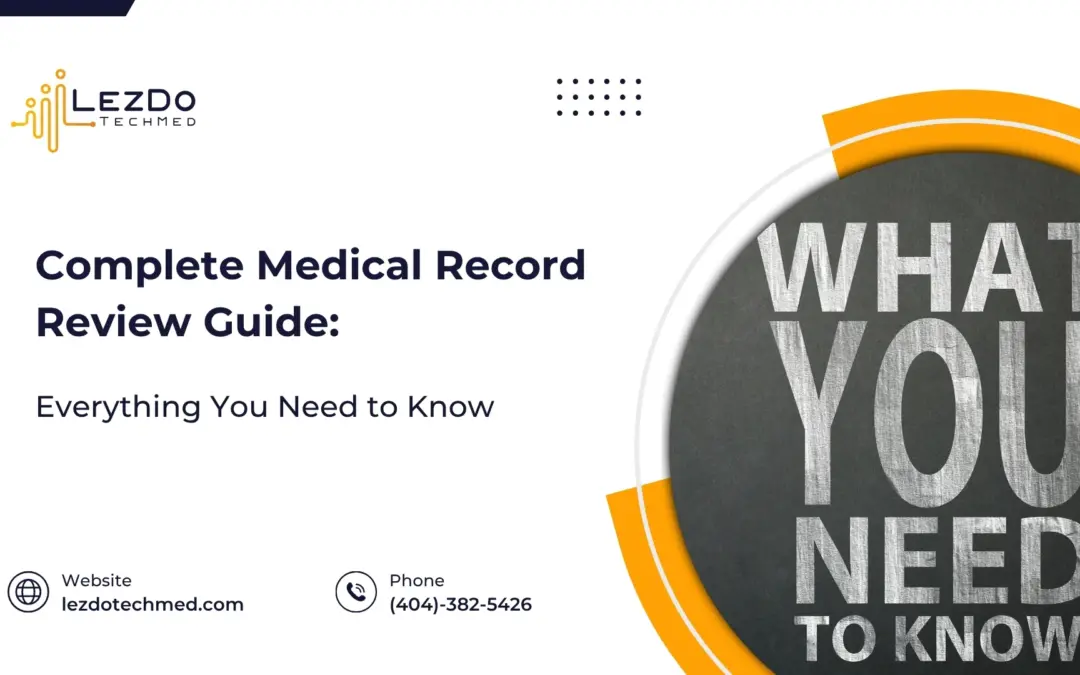Legal claims like personal injury, medical malpractice and worker’s compensation, where injury and treatment forms the basis, medical charts play a vital role. These charts document every aspect of a patient’s medical journey, from diagnoses to treatments and outcomes, providing vital evidence while battling injury claims. If the medical records are accurate and comprehensive, they can offer a reliable account of patient care. Missing or inaccurate information can have serious repercussions for both the patients and the healthcare providers in legal claims.
Understanding Medical Charts
Medical charts or medical records are detailed documents that healthcare providers create to track a patient’s health status.
- Demographics: Basic personal data of the patient.
- Diagnosis: Details of the patient’s condition or injury.
- Treatment: Information on what treatments were administered or prescribed.
- History: Patient’s previous health conditions or medical history.
- Progress Notes: Details on how the patient’s condition is progressing or worsening.
- Medications: List of medications prescribed, including dosages and duration.
- Test Results: Results of X-rays, lab tests and other diagnostic tests.
Medical charts can have errors or inaccuracies. According to a study published in the PubMed on the accuracy of medical charts, they found 636 errors in medical charts. The study compared 105 medical visit notes from 36 physicians. They identified 181 charting details that did not take place, and 455 incidents that were not documented. will this inaccuracy have any consequences in injury claims? Let’s see in detail.
Why does accuracy of medical charts matter in injury claims?
Medical charts provide a clear timeline of events starting from the individual’s accident, surfacing of symptoms, diagnosis and treatment, which forms the basement for any injury claim. Courts rely on this evidence to solve issues in cases like personal injury, medical malpractice, worker’s compensation, product liability and disability claims. Medical charts help the judges and attorneys understand the medical context of the injuries and treatment decisions.
Accurate medical charts are also crucial to defend healthcare providers from negligence claims to prove that they have provided standard care to the patients. When medical charts are inaccurate and incomplete, they can confuse the facts and negatively impact both the patients and the healthcare providers when facing legal claims. Inaccuracy in medical charts can cast shadow of doubt over the credibility of injuries and the treatments administered.
Let’s breakdown the several factors which makes the medical charts vital in injury claims.
- Proof of injury or condition
In personal injury or medical malpractice cases, proving that the injury or illness exists is the first step. Medical charts provide that proof. They offer a timeline of events showing when the injury occurred, how it was treated, and how the condition progressed. Without accurate medical records, it becomes harder to prove that the injury or illness is real and that it happened as claimed.
- Establishes causation
Medical charts help establish a link between the injury and the event that caused it. In case of a car accident, the victim’s medical charts will show that the injury occurred during the accident. This will help the plaintiff in proving causation of injuries. Without medical charts, it would be difficult to hold the responsible party liable.
- Demonstrates injury severity
Flawless medical charts help the victims and their attorneys demonstrate the severity of an injury or condition, which is crucial for determining the compensation in a claim. A person with a severe injury that requires surgery, rehabilitation, and long-term care will likely receive a higher settlement than someone with a minor injury. Medical charts provide evidence of the injury’s impact on the victim’s life, including pain and suffering, and the need for ongoing treatment.
- Determines treatment costs
To calculate the damages in a claim, medical charts can be helpful, as they document the treatment costs incurred by the patient. They include expenses from emergency room visits to follow-up appointments, medications and therapy sessions. These costs are often reimbursed as part of a settlement or court verdict, and so the accuracy of the charts directly affects the amount of compensation.
- Supports expert testimony
In many personal injury claims, doctors or other medical professionals are called to testify as expert witnesses. They rely on comprehensive medical charts to provide their expert opinion. If the records are flawed or incomplete, it becomes difficult for the expert to give a clear and reliable testimony. A well-documented medical chart allows the expert to confirm that the injuries were serious, the treatment was necessary, and the patient’s condition aligns with the claim.
- Helps build credibility
Accurate medical charts enhance the credibility of both the patient and their legal claim. When the records are thorough and precise, it demonstrates that the patient is being honest about their condition and injury. Inconsistent or missing medical records, on the other hand, can create doubt and lead to skepticism from insurance companies, attorneys, and judges on the patient’s injury claims. This lack of credibility can hurt a claim, making it harder to get the compensation the patient deserves.
What happens if the medical charts are inaccurate?
Incomplete or inaccurate medical charts can affect the personal injury claims negatively. They:
Weaken the claim
When medical charts are incomplete, inconsistent, or incorrect, it weakens the entire case. If there are gaps in treatment or contradictions in the charts, the defense team may argue that the injury isn’t as severe as claimed or the injury isn’t related to the subject incident in dispute. This can lead to reduced settlement or even dismissal of the claim.
Delay the legal processes
Inaccurate or incomplete medical records can also cause delays in the legal process. Lawyers need comprehensive and precise records to prepare their case, and if the charts miss vital information, they may have to request additional documentation or clarification, which can slow things down. Legal delays in claim processing can be frustrating for the plaintiff as it may prolong the time it takes to reach a settlement.
Legal penalties for the healthcare providers
In medical malpractice cases, inaccurate or incomplete medical charts can expose the healthcare providers to legal penalties. The doctors or other medical staff who maintain the medical charts are liable for ensuring the comprehensiveness of medical charts. Failing to ensure medical chart accuracy is considered negligence. This can lead to legal action against the medical providers. Inaccurate medical records can also damage a provider’s reputation. Legal penalties for poor record keeping from the regulatory bodies and loss of patient trust can spoil the career too. Falsifying medical records can end up in criminal charges and loss of medical license.
Can EMRs ensure medical data accuracy in legal claims?
Electronic Medical Records (EMRs) has significantly lessened the errors that can otherwise occur in paper charts. They have also improved accuracy of medical data to an extent. However, without proper charting practices, healthcare providers cannot ensure 100% accuracy in EMRs. Medical record errors can occur due to issues in data entry, technical glitches, or failure in updating complete data and also make a legal claim weak in court.
Healthcare providers should take steps to ensure that medical records are both complete and accurate. This includes regularly updating records, ensuring that all tests and treatments are properly documented, and reviewing data to eradicate potential errors. With the increasing use of Electronic Medical Records (EMRs), providers must remain vigilant to avoid issues related to data entry and system glitches.
To wrap up, medical charts are not just healthcare documents; they hold crucial legal value in medico-legal claims. They form a solid foundation for establishing the patient’s medical condition, causation and its impact on the patient’s personal and social life before the jury. Therefore, accuracy of medical charts becomes a necessity both in healthcare and legal contexts. They not only help the patient’s validate their claims but also protect the healthcare providers by proving that they have provided adequate care to the patient.
Want accurate review of medical charts?
Leave your charts with us & get crisp medical summaries!












